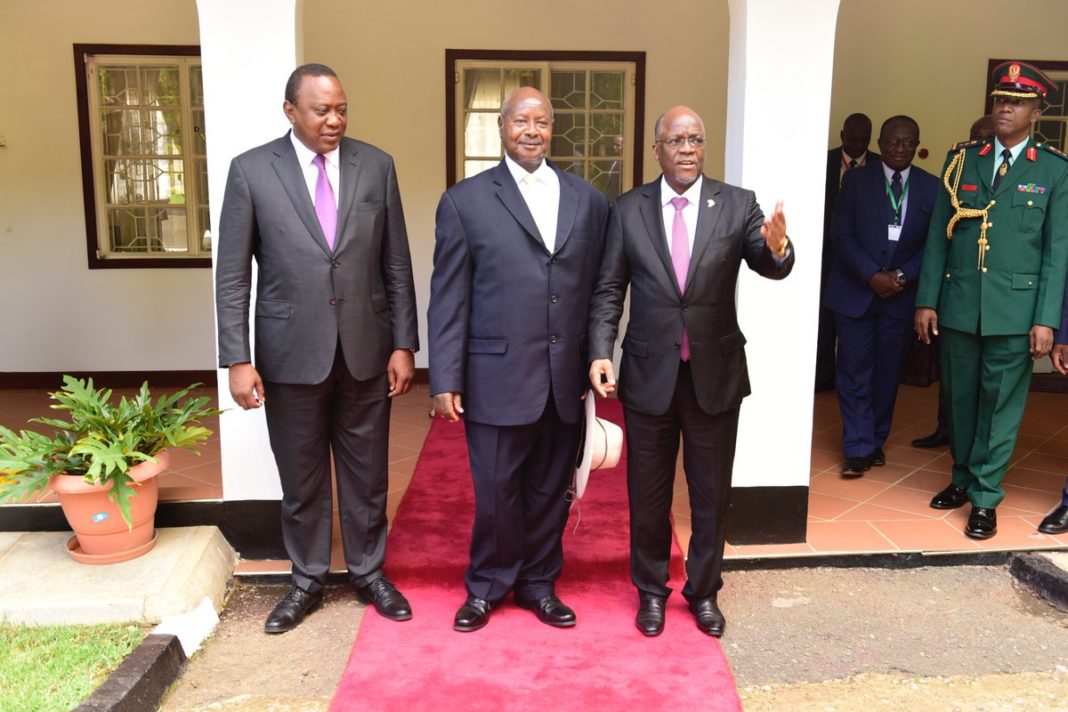The political differences between Burundi and Rwanda have started to derail the progress of the East African Community (EAC) whose leaders have a plan for political federation, the final stage of the integration of the six countries that the form one of Africa’s regional economic blocs.
On Friday nationals of Kenya, Uganda and Tanzania were shocked as their leaders-President Uhuru, Yoweri Museveni and Dr.John Magufuli came out of the summit hall in Arusha to announce that the 20th Ordinary Meeting of the Summit of the East African Community Heads of State has been postponed to a later date.The Summit would not take place due to a lack of quorum caused by the absence of Burundi.
“According to Rule 11 of the Rules of Procedure of the Summit of the EAC Heads of State, quorum is made of all Partner States representation which is in consonance with decision making by consensus under Article 12 of the Treaty,” said Kirunda Kivejinja, who is the Chairman of EAC Council of Ministers and Uganda’s 2nd Deputy Prime Minister and Minister of EAC Affairs.
President Paul Kagame of Rwanda and his Burundian counterpart Pierre Nkurunziza did not travel for the Summit in Arusha even though the former sent in a representative in the names of former EAC Secretary General Amb. Richard Sezibera who also is Rwanda’s Minister of Foreign Affairs. The failed Summit meeting was preceded by the 38th Meeting of the Council of Ministers which was also was not attended by the Republic of Burundi. South Sudanese president Salvar Kiir travel for the Summit but sent in a representative.
Among the items which were on the Provisional Agenda of the 20th Summit of the EAC Heads of State were: the status of ratification of various protocols; the status of resolution of long outstanding non-tariff barriers, and; the progress report on the adoption of Political Confederation as a Transitional Model to the East African Political Federation.
Other items on the Agenda were: the roadmap for the accelerated integration of the Republic of South Sudan into the EAC, and; the verification exercise for the admission of the Republic of Somalia into the Community.
The Summit was also to consider reports on modalities for the promotion of Motor Vehicle Assembly in East Africa aimed at reducing importation of used vehicles into the Community, and; the review of the textile and leather sector with a view to developing a strong and competitive domestic sector that gives consumers better choice than imported textile and footwear.
The Summit was also to review a progress report by the Council of Ministers on the Summit Directive on having two (2) Deputy Secretaries General at the Community recruited competitively on a rotational basis among the Partner States.
The Summit had been expected to assent to various Bills passed by the East Legislative Assembly, namely: the EAC Polythen Materials Control Bill, 2016; the Administration of the East African Court of Justice Bill, 2018; the EAC Monetary Institute Bill, 2018, and; the EAC Customs Management (Amendment) Bill, 2018.
All the above important issues could not be acted on just because Burundi absconded. It appears time to reconsider the EAC treaty has come.
Burundi and Rwanda are not the original members of the EAC. They were admitted upon request from the two governments respectively, having taken note of the benefits of the bloc. Same to South Sudan which was the latest to enter the bloc.
Political analysts say the original EAC countries of Kenya, Tanzania and Uganda must maintain the speed of the integration progress. They argue that the three shouldn’t be pushed back by the bickering between neighbours Rwanda and Burundi who only joined in 2007. The EAC was originally formed in 1967.
The action of Burundi, analysts say must be dealt with, by imposing punitive measures or worse still Burundi which has disrespected the EAC activities that ran almost for the whole of last week must be suspended for a while and the rest of the leaders push with programmes that benefit citizens. “We cannot wait for Burundi which has a population of 10.86 million people as of 2017, compared to bloc’s estimates of 150 million people with GDP of US$75.5 billion. Burundi has a GDP of US$3.478 billion as of 2017. That means Burundi benefits more from the bloc than what the rest of members get from Burundi,” an analyst said.
Another analyst is of the view that Burundi wants the rest of EAC Partner States to reign on Rwanda which Burundian state considers as a security threat but Rwanda has always denied the allegations. Internally, the two countries are victims of tribal tensions mainly because they comprise of two major tribes-the Hutu and Tutsi. Accusations are that the Kigali regime is not in favour of Nkurusinza being President of Burundi. Burundi accuses Rwanda of ‘recruiting’ Burundian refugees into the military as well as supporting rebels, an accusation that Rwanda denies.
After an attack on June 19 in Nyabimata Sector in Rwanda’s Southern Province, Rwanda alleged that the attack was carried out by Burundian security agencies and proxies. Rwanda says Burundi’s actions which include a blockage of the movement of goods and passenger vehicles across the border which is a violation of the EAC Common Market Protocol.
Burundi wants EAC, the African Union and the United Nations to help solve the impasse yet Rwanda says it is not ready for any dialogue based on mere allegations by Burundi.
But that aside, the latest report indicates that Burundi is the biggest defaulter in terms of budget contributions to the EAC. Burundi and South Sudan owe the EAC more than US$12 million. This also illustrates Burundi is not so much into the EAC issues. This and other reasons should force the remaining partner states to move on without Burundi, after all the country has plans to join SADC.





